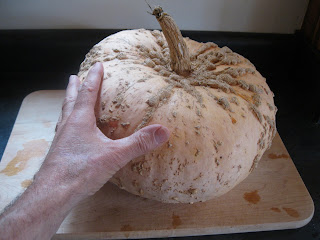Vegetarian, mostly vegan. Good food. Simple kitchen. With notes on slow food, culture and agriculture.
Saturday, September 28, 2013
Thursday, September 26, 2013
Monday, September 2, 2013
Thursday, May 16, 2013
Dirt, Germs, Food and Your Gut
Another magnificent essay by Michael Pollan:
"I can tell you the exact date that I began to think of myself in the first-person plural — as a superorganism, that is, rather than a plain old individual human being. It happened on March 7. That’s when I opened my e-mail to find a huge, processor-choking file of charts and raw data from a laboratory located at the BioFrontiers Institute at the University of Colorado, Boulder. As part of a new citizen-science initiative called the American Gut project, the lab sequenced my microbiome — that is, the genes not of “me,” exactly, but of the several hundred microbial species with whom I share this body. These bacteria, which number around 100 trillion, are living (and dying) right now on the surface of my skin, on my tongue and deep in the coils of my intestines, where the largest contingent of them will be found, a pound or two of microbes together forming a vast, largely uncharted interior wilderness that scientists are just beginning to map..."
Sunday, May 12, 2013
Soil Biodiversity as a National Security Issue
Jim Robbins for the NYTimes
& See
Friday, May 10, 2013
A Week of Groceries Around the World
Saturday, May 4, 2013
Homemade Hot Sauce
Cider vinegar (balsamic is better); Cayenne pepper (any ground pepper will do); a bit of chili powder; salt; I often add finely chopped ginger or garlic; some ground flax seed to give it some body. Experiment to see what proportions you like. This is far cheaper than commercial brands and you can put in anything you can think of... I really like it and make a new bottle about once a week.
Sunday, April 21, 2013
Thursday, April 18, 2013
Cooked: A Natural History of Transformation
An excerpt from Bittman:
But Pollan isn’t about to become a cookbook writer, at least not yet. In “Cooked: A Natural History of Transformation,” out Tuesday, he offers four detailed recipes, used as examples to explore how food is transformed: for Bolognese, pork shoulder, sauerkraut and bread, each an illustration, he says, of the fundamental principles of cooking.
The recipes, while not exactly afterthoughts, are less important than his insistence that cooking itself is transformative. Almost as soon as we sit down in my living room, he says: “Cooking is probably the most important thing you can do to improve your diet. What matters most is not any particular nutrient, or even any particular food: it’s the act of cooking itself. People who cook eat a healthier diet without giving it a thought. It’s the collapse of home cooking that led directly to the obesity epidemic.”
Thursday, March 28, 2013
Sunday, March 17, 2013
March Madness
Galeaux d'eysines - These obviously keep well, and they taste good - but they are just too BIG - and next year we will probably just grow more Hubbard squash instead. This is going to be dinner for a few nights and a couple of pies. I will get up the energy to cut it up later this morning.
Friday, February 22, 2013
Wednesday, February 20, 2013
Wednesday, January 30, 2013
Tuesday, January 1, 2013
Nutrigenomics
It seems to me that this is a supremely important conceptual revolution -
Food contains information that speaks to our genes, not just calories for energy. We are learning from research in the field of nutrigenomics, that good "talks" to our DNA switching on or off genes that lead to health or disease. What you eat programs your body with messages of health or illness.
Spicy Squash Soup
This variation on Squash Soup from Ann Gentry's excellent Real Food Daily Cookbook is simple and wonderful. Butternut squash finely cubed and simmered until quite soft - plus ample chopped fresh ginger, salt, pepper, a pinch of nutmeg and a finely chopped onion. You could put in all sorts of other things - sweet potato would be terrific. When the squash is soft you could blend it all in a blender but I just mashed it a bit with a hand potato masher. We had it with popcorn and squash pie for dessert (of course).
Subscribe to:
Posts (Atom)




















